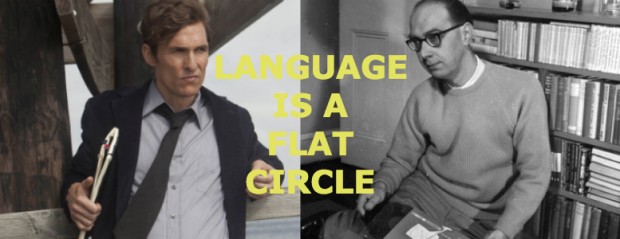A weekly poem, accessibly annotated.
This week, having just finished True Detective, I’ve chosen “Sad Steps” by Philip Larkin.
*
Sad Steps
Groping back to bed after a piss
I part thick curtains, and am startled by
The rapid clouds, the moon’s cleanliness.
Four o’clock: wedge-shadowed gardens lie
Under a cavernous, a wind-picked sky.
There’s something laughable about this,
The way the moon dashes through clouds that blow
Loosely as cannon-smoke to stand apart
(Stone-coloured light sharpening the roofs below)
High and preposterous and separate—
Lozenge of love! Medallion of art!
O wolves of memory! Immensements! No,
One shivers slightly, looking up there.
The hardness and the brightness and the plain
Far-reaching singleness of that wide stare
Is a reminder of the strength and pain
Of being young; that it can’t come again,
But is for others undiminished somewhere.
*
“Groping back to bed after a piss”—from the first line, we are in refreshing poetic territory. Philip Larkin, an Englishman who died in 1985, was a stubbornly cantankerous poet; his insistence on realist pessimism seems a fitting tribute to Matthew McConaughey’s instant-classic performance as Rust Cohle in HBO’s True Detective.
If you haven’t seen the show, this short video will acquaint you with the worldview of McConaughey’s character. Rust is constantly reminding others of the futility and meaninglessness of human existence; his aphorisms are depressing, but somehow also thrilling in their pithiness and sheer darkness.
The same can be said of Larkin. One of his best-known poems begins this way: “They fuck you up, your mum and dad.” The end of the poem could be Rust himself, if Rust spoke in rhyme:
Man hands on misery to man.
_It deepens like a coastal shelf.
Get out as early as you can,
_And don’t have any kids yourself.
In “Sad Steps,” Larkin makes fun of the moon. Look at that thing hanging up there, all proud of itself. It is a little preposterous. Just as Rust used the mainstream piety of Woody Harrelson’s character as a punching bag, eviscerating his hypocrisy, Larkin takes a moment to satirize pompous writers—the kind who might call the moon a “medallion of art!”
“Wolves of memory,” whatever those are? Fuck the wolves of memory, says Larkin. For him, the moon tells us one thing: we were young once, and we cannot be young again.
So, Larkin keeps it real. He’s also an incredible writer, which helps me digest his doses of fatalism. “Sad Steps” describes a bright, moonlit night better than anything I know: the “wind-picked sky,” with “stone-coloured light sharpening the roofs below”—that’s exactly how it looks!
Larkin’s greatest hits are worth your time, all of them dismal and extremely quotable. “Aubade” begins: “I work all day, and get half-drunk at night. ” He goes on to describe—you guessed it—the inevitability of death, “the sure extinction that we travel to.” Larkin brushes aside various forms of coping:
…Courage is no good:
It means not scaring others. Being brave
Lets no one off the grave.
Death is no different whined at than withstood.
In another echo of Rust, he scorns religion, “That vast moth-eaten musical brocade / Created to pretend we never die.” I bet this guy was great at parties.
*
Quick notes—MORE LARKIN:
~Larkin on glimpsing young lovers (“guess he’s fucking her”).
~Larkin on the misery of rejection and the limited solace of masturbating. Rust and Philip also share a somewhat tortured relationship to women.
~My favorite: Larkin on returning to his university campus for the funeral of a half-remembered acquaintance. Bonus: grim musings about the senselessness of having children. More aphorisms: “Life is first boredom, then fear.”
I have to quote from the end of that last poem—a beautiful, bracing passage about the rigidity of personality:
…Where do these
Innate assumptions come from? Not from what
We think truest, or most want to do:
Those warp tight-shut, like doors. They’re more a style
Our lives bring with them: habit for a while,
Suddenly they harden into all we’ve got
And how we got it.
Woooooo! Total ray of sunshine. At times I have to giggle at his gloominess, and I think that’s partially because it’s so new to me: Americans, and American writers, are relatively optimistic. Larkin’s Englishness is for someone else to write about: for example, here’s Christopher Hitchens.
*
Poem republished in accordance with principles of fair use.
Image of McConaughey and Larkin via the internet, smushed together and captioned by me.
You, Too, Dislike It appears every Thursday.


















